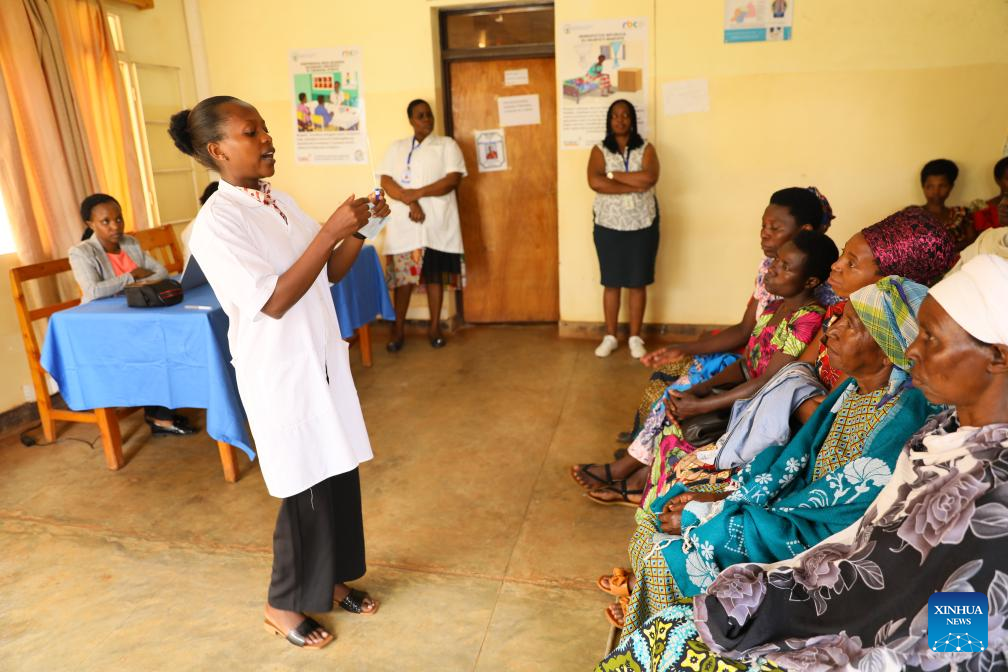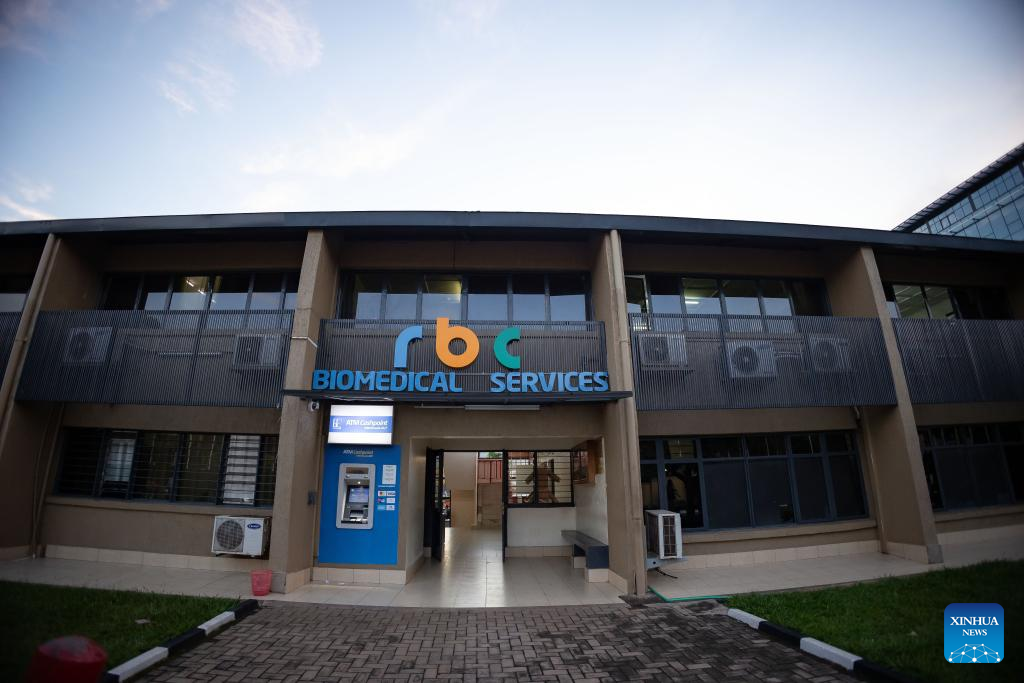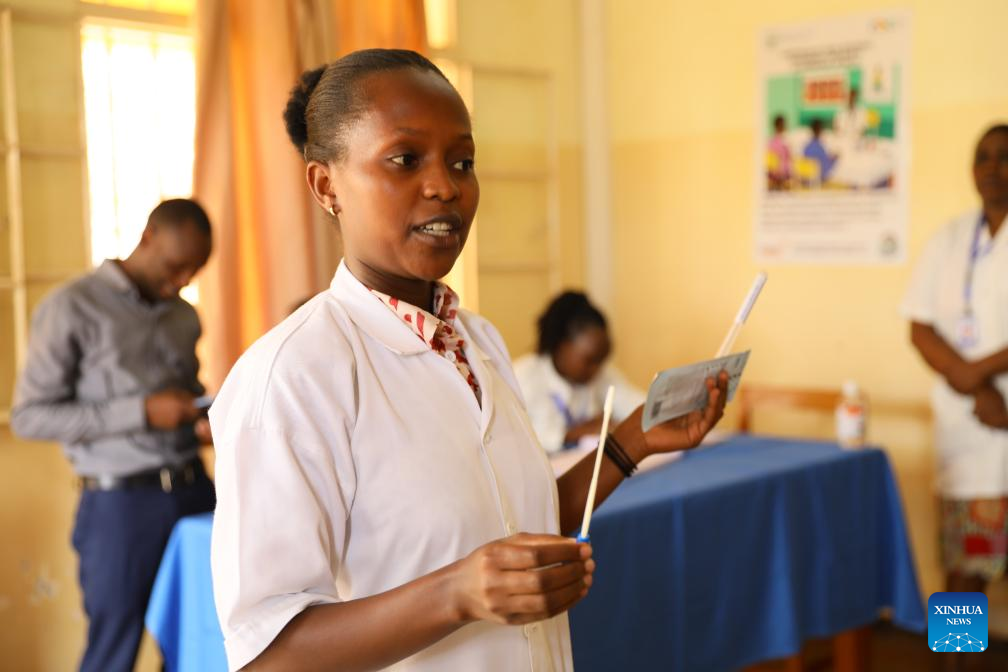A healthcare worker explains cervical cancer testing and prevention at the Remera Health Center in Remera Sector, Ngoma District, Eastern Region, Rwanda on April 30, 2024. The Genome Institute – BGI Genomics, a leading global provider of integrated precision medicine solutions, in collaboration with Rwanda launched the medical center Vital cervical cancer screening program on Tuesday at Remera Health Centre. (Xinhua/Jie Li)
KIGALI, May 1, 2019 (Xinhua) – The Genome Institute – BGI Genomics, the world's leading provider of integrated precision medicine solutions, in collaboration with the Rwanda Biomedical Center (RBC), on Tuesday launched a cervical cancer screening program at the Remera Health Center in Kigali. Remera Sector, Njoma District, Eastern Region.
Cancer screening activities will provide 20,000 HPV DNA tests to local women, aiming to improve cervical cancer detection and prevention efforts and improve local precision medical testing capabilities.
Speaking at the event, Budence Rubinjisa, Governor of the Eastern Province, praised the China-based company for initiating an important program aimed at strengthening cervical cancer detection and prevention efforts, especially in the Eastern Province.
“I thank the Chinese government for supporting Rwanda’s efforts in various health activities, including health infrastructure, medical support and training,” he said.
Rubinjisa stressed that cancer remains a frightening disease that requires effective prevention and radical measures to ensure everyone participates and communicates with our people in the fight against breast or cervical cancer. “As local leaders, we are committed to ensuring traceability and awareness,” he said.
Speaking during the ceremony, Chinese Ambassador to Rwanda Wang Xuekun said that BGI Genomics is a leading company in the genetics industry in China and the world. Currently, BGI Genomics has donated $1.6 million worth of medical equipment and supplies to improve women's health in Rwanda.
“I highly appreciate this step as it promotes Rwanda's healthcare industry and enhances the friendship between China and Rwanda,” he added.
Wang noted that China and Rwanda have conducted fruitful cooperation in the healthcare industry, noting that China helped build Kibungo Hospital and Masaka Hospital, covering 500,000 people.
He noted that since 1982, China has sent 24 batches of medical teams to Rwanda, with a total of 303 doctors. To date, they have treated more than 700,000 patients, performed more than 38,000 surgeries, and saved more than 16,300 lives.
Albert Tuyishimiye, head of the HIV/AIDS Prevention and Disease Control Department at RBC, told Xinhua in an interview during the launch event that the program will help Rwandans address the issue of cervical cancer.
“HPV detection or screening is the best approach compared to what we are used to in the country. Early and timely screening and diagnosis will facilitate treatment and reduce the increasing mortality and morbidity associated with cervical cancer.
“In China, HPV DNA testing technology has been applied in many large-scale public health service programs and has achieved remarkable results. We hope that cervical cancer screening will benefit from BGI Genomics’ technology and model,” said Du Yutao, COO of BGI Genomics. “Self-sampling is taking place in countries around the world and helping accelerate the goal of eliminating cervical cancer worldwide.”
According to the World Health Organization guidelines for screening and treatment of precancerous cervical lesions and for the prevention of cervical cancer, HPV DNA testing, with an accuracy rate of 95%, is the first-line screening method. An option for this disease. A self-sampling model is recommended, where women collect their own test samples, followed by central testing.
The HPV DNA testing products developed by BGI Genomics are suitable for large-scale population screening and accurate HPV genotyping. One test can detect 14 high-risk HPV types significantly associated with cervical cancer incidence, according to WHO guidelines, and is validated by extensive clinical data to be suitable for self-sampling.
This photo taken on April 30, 2024 shows an outside view of the Rwanda Biomedical Center in Kigali, Rwanda. The Genomics Institute-BGI Genomics, the world's leading provider of integrated precision medicine solutions, in collaboration with the Rwanda Biomedical Centre, launched a cervical cancer screening program on Tuesday at the Remera Health Centre. (BGI Genomics/Disclosure via Xinhua News Agency)
A healthcare worker explains cervical cancer testing and prevention at the Remera Health Center in Remera Sector, Ngoma District, Eastern Region, Rwanda on April 30, 2024. The Genome Institute – BGI Genomics, a leading global provider of integrated precision medicine solutions, in collaboration with Rwanda launched the medical center Vital cervical cancer screening program on Tuesday at Remera Health Centre. (Xinhua/Jie Li)

“Wannabe internet buff. Future teen idol. Hardcore zombie guru. Gamer. Avid creator. Entrepreneur. Bacon ninja.”



